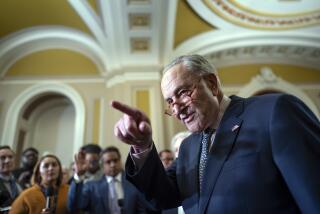Cheney Yanks White House Into Filibuster Fray
- Share via
WASHINGTON — The White House broke its silence Friday on the congressional battle over judges, with Vice President Dick Cheney pledging to side with Senate Republicans in their possible bid to prevent Democrats from filibustering judicial nominees.
Senate Democratic leader Harry Reid of Nevada responded angrily to Cheney’s remarks, accusing President Bush of breaking his word that the administration would not intervene in the conflict.
“Last week, I met with the president and was encouraged when he told me he would not become involved in Republican efforts to break the Senate rules,” Reid said. “Now, it appears he was not being honest, and that the White House is encouraging this raw abuse of power.”
Cheney, who as president of the Senate could play a key role if Republicans move forward with what has become known as the nuclear option, told a group of Republican lawyers that if his vote was needed, he would back a controversial rule change preventing filibusters of nominees to the federal bench.
“The decision about how to proceed will be made by the Republican leadership in the Senate, but if the Senate majority decides to move forward and if the issue is presented to me ... I will support bringing those nominations to the floor for an up-or-down vote,” Cheney said.
There had been little doubt that Cheney would support Senate Republicans if they decided to push ahead with the rule change. But his decision to take a public stance -- and Reid’s vociferous response -- illustrate the heightened attention to a confrontation that both parties describe as increasingly unavoidable.
Cheney would be expected to preside over the chamber if Republicans press for a vote on barring the filibuster for judicial nominees. In case of a 50-50 vote, he would break the tie.
The filibuster is the use of debate to keep an issue open for an indefinite period. The filibuster cannot be broken without the votes of 60 senators, and Republicans number 55. As a result, a minority of 41 senators could effectively block an issue or a nominee from coming to a vote by refusing to end the debate.
Democrats note they have used the filibuster to block 10 of 205 judges Bush has nominated to the federal bench. They argued that those 10 would have pursued an extremist conservative agenda.
Cheney, in his remarks to the Republican National Lawyers Assn., summarized the GOP case against the filibuster of judicial nominees, calling it “an attempt to limit a president’s ability to appoint judges who have majority support in the United States Senate.”
He added: “The tactics of the last few years, I believe, are inexcusable, particularly when you’re dealing with men and women of the caliber of those nominated by George W. Bush.”
A handful of moderate and maverick Republican senators have indicated they would not support changing the filibuster rule, making it unclear whether Majority Leader Bill Frist (R-Tenn.) has the votes to implement it.
Reid staff members said Friday that they had been told by Republican aides that Frist would wait at least a week to launch the series of parliamentary maneuvers needed to change the rule.
One reason, some Republicans say, is that Frist wants to give pro-GOP groups time to intensify their organizing and public relations efforts on behalf of ending the filibuster for judicial nominees.
On Friday, Frist taped a five-minute video speech to one such group, the Family Research Council, which plans to simulcast it to members at churches around the country on Sunday.
More to Read
Get the L.A. Times Politics newsletter
Deeply reported insights into legislation, politics and policy from Sacramento, Washington and beyond. In your inbox twice per week.
You may occasionally receive promotional content from the Los Angeles Times.










